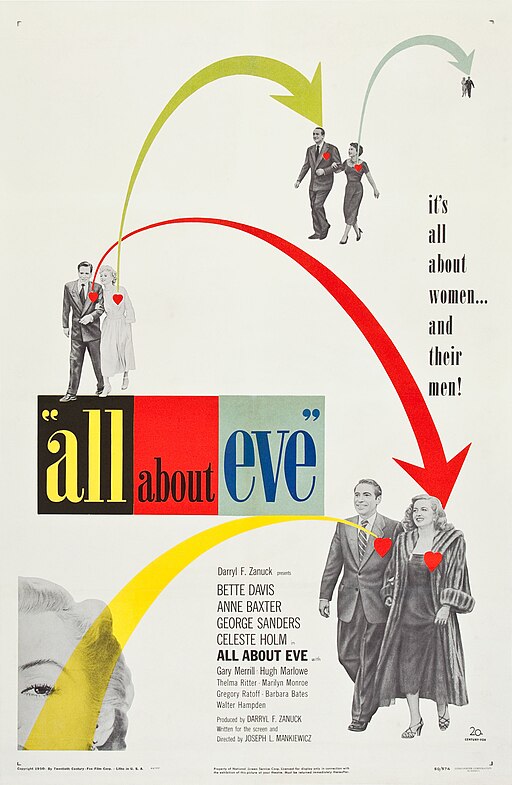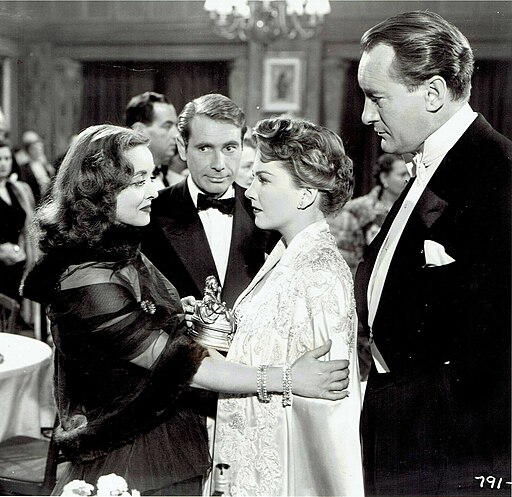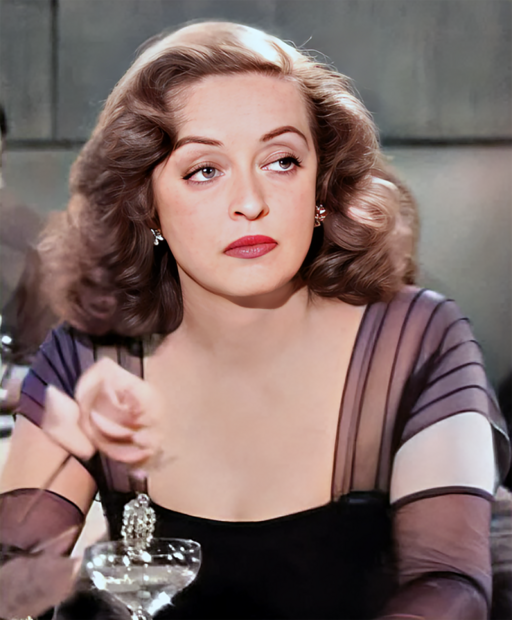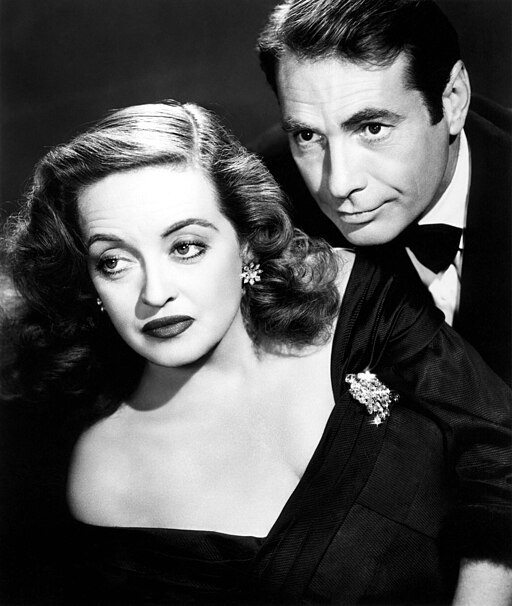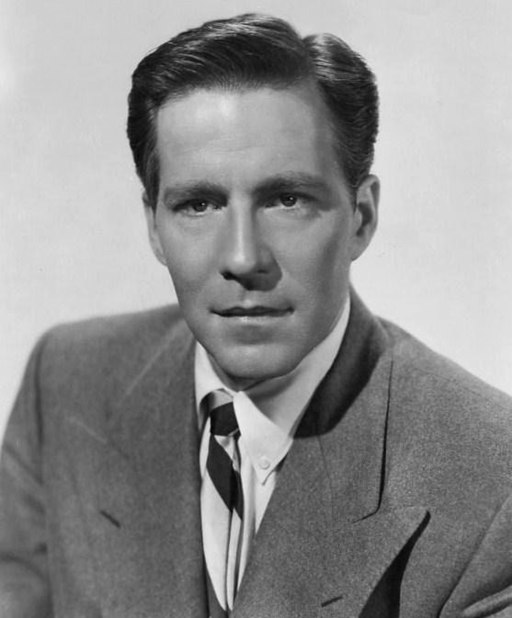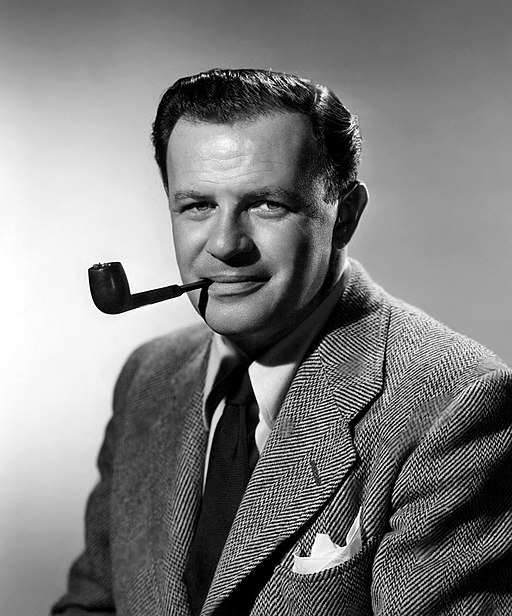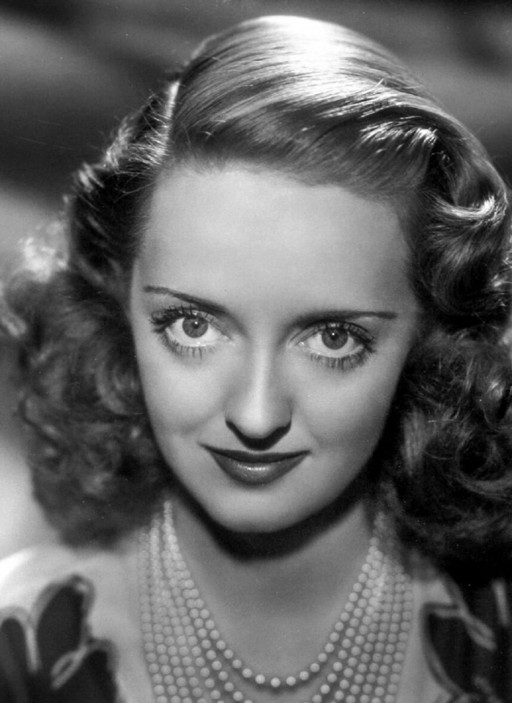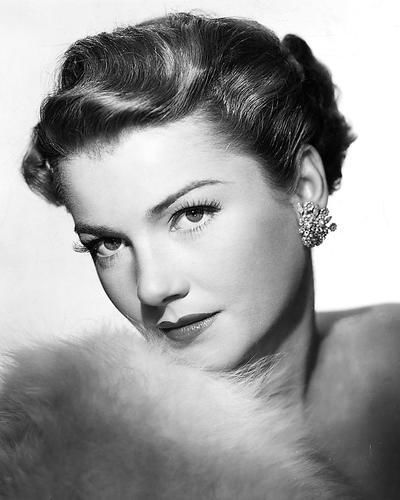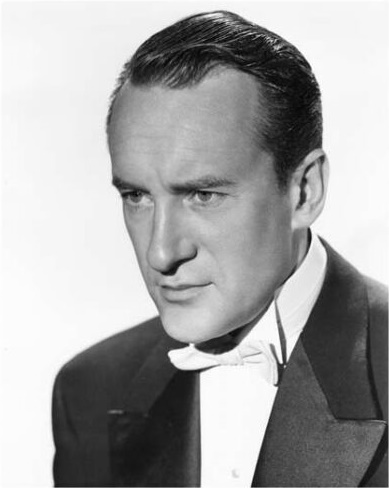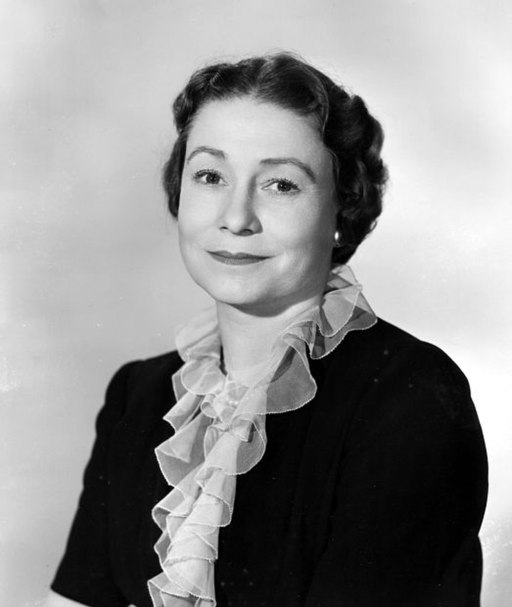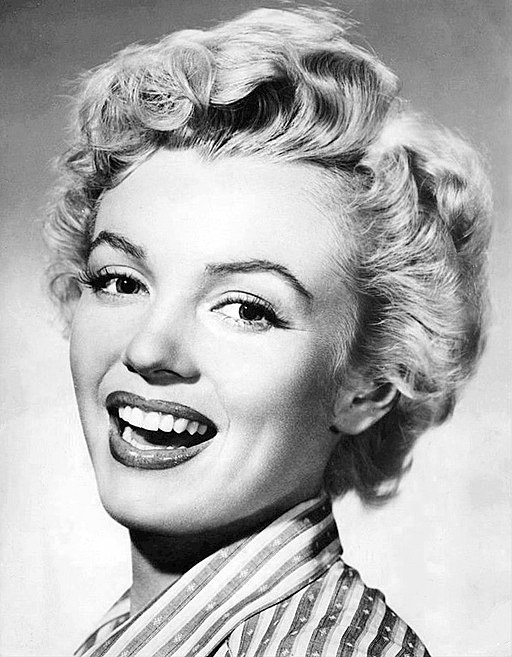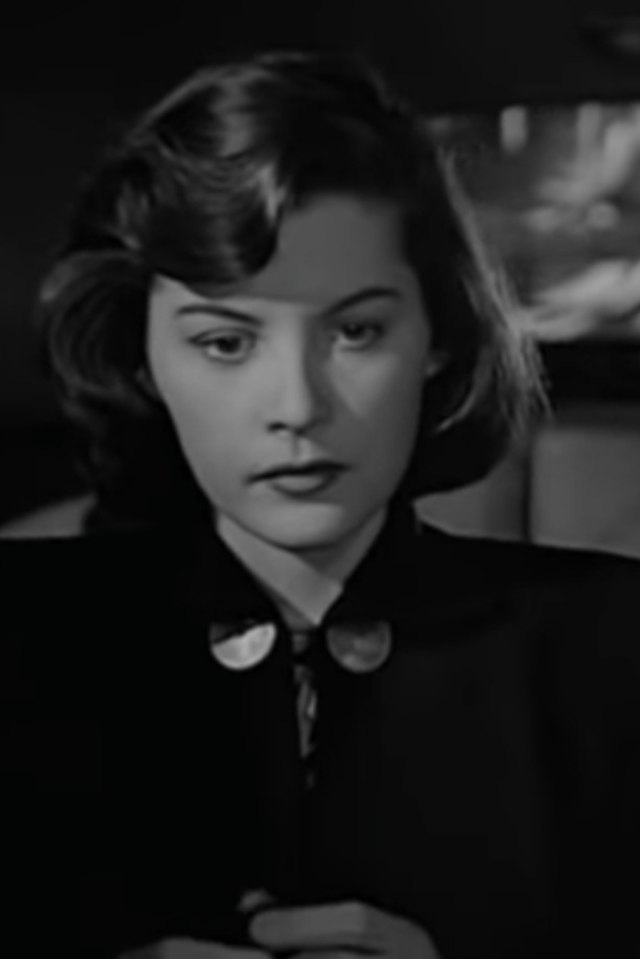All About Eve - 1950
back| Released by | 20th Century Fox |
| Director | Joseph L. Mankiewicz |
| Producer | Darryl F. Zanuck |
| Script | Joseph L. Mankiewicz, based on the 1946 short story |
| Cinematography | Milton R. Krasner |
| Music by | Alfred Newman |
| Running time | 138 minutes |
| Film budget | $1,4 million |
| Box office sales | $3 million U.S. box office sales |
| Main cast | Bette Davis - Anne Baxter - George Sanders - Celeste Holm - Gary Merril - Hugh Marlowe - Thelma Ritter - Marilyn Monroe |
All About Eve
A Masterful Exploration of Ambition and Betrayal in the Theater World
"All About Eve" received widespread critical acclaim upon its release and has remained a seminal work in the annals of American cinema.
It won six Academy Awards, including Best Picture, Best Director (Joseph L. Mankiewicz), and Best Supporting Actor (George Sanders), and holds the record for the most female acting nominations (four) from any single film.
The film is noted for its witty dialogue, exploration of themes like ambition, fame, and aging, as well as its insights into the theatre world. It's often cited as one of the best films ever made.
Related
All About Eve (1950)
"All About Eve" is a 1950 film directed by Joseph L. Mankiewicz that has become an iconic piece of cinema, celebrated for its exploration of ambition, betrayal, and the dynamics of theatrical life. The film is a complex narrative about Eve Harrington (Anne Baxter), a seemingly naive and ambitious young fan who insinuates herself into the life of Margo Channing (Bette Davis), a prominent yet aging Broadway star. Through cunning and manipulation, Eve becomes Margo's understudy and eventually tries to supplant her in the theater community.
Summary
The story opens at an awards banquet where Eve Harrington is receiving the prestigious Sarah Siddons Award for her breakout performance on Broadway. The narrator, theatre critic Addison DeWitt (George Sanders), introduces us to the key players in the drama that unfolded to bring Eve to this pinnacle. The film then flashbacks to Eve's initial meeting with Margo, facilitated by Margo's friend Karen Richards (Celeste Holm), the wife of playwright Lloyd Richards (Hugh Marlowe).
Eve quickly ingratiates herself with Margo, becoming her assistant. Her dedication and hard work seem innocent at first, but her ultimate ambition to take over Margo's career becomes increasingly apparent. Eve uses her relationship with Margo to meet influential people in the theater world, including the producer Max Fabian and Lloyd Richards, for whom she harbors aspirations of performing his plays.
As Eve's true nature and intentions become clear, the relationships between the characters become strained. Margo begins to see Eve as a threat, not just professionally but also in her personal life, fearing the loss of her younger boyfriend, director Bill Sampson (Gary Merrill), to the ingenue. The tension reaches a peak when Eve manipulatively arranges to become Margo's understudy and performs brilliantly in her place during one performance, leveraging this opportunity to further her career at Margo's expense.
The climax of the film reveals Eve's ultimate victory in the theater world but at a personal cost. Addison DeWitt, who has discovered the truth about Eve's past and her manipulative ways, gains control over her by threatening to expose her unless she complies with his demands.
Analysis
"All About Eve" is much more than a story about the theater; it's a study of the human condition, exploring themes of ambition, identity, and the fear of aging, especially for women in the public eye. Margo Channing's character represents a woman grappling with the inevitable decline of her youth and stardom, contrasted with Eve's youthful ambition and deceitful rise to fame. The film is celebrated for its sharp, witty dialogue and complex characters, particularly Margo, whose depth and vulnerability Bette Davis captures with nuance and strength.
Joseph L. Mankiewicz's screenplay and direction are masterful, weaving a tale that is both a critique of show business and a timeless story of human ambition and jealousy. The film's narrative structure, using a flashback from the awards ceremony, allows viewers to see Eve's rise from multiple perspectives, each revealing different facets of the characters' lives and motivations.
The cinematography by Milton R. Krasner and the score by Alfred Newman complement the film's narrative and emotional depth, enhancing the drama and tension of Eve's machinations and Margo's existential crisis.
"All About Eve" remains a landmark film for its feminist undertones, exploring the roles of women in society and the entertainment industry, their relationships with each other, and the pressures they face. It's a film that resonates with audiences even decades after its release, a testament to its enduring relevance and the timeless nature of its themes.
Trailer "All About Eve":
Full Cast of “All About Eve”:
- Bette Davis as Margo Channing
- Anne Baxter as Eve Harrington
- George Sanders as Addison DeWitt
- Celeste Holm as Karen Richards
- Gary Merrill as Bill Sampson
- Hugh Marlowe as Lloyd Richards
- Thelma Ritter as Birdie Coonan
- Gregory Ratoff as Max Fabian
- Marilyn Monroe as Miss Caswell
- Barbara Bates as Phoebe
- Walter Hampden as Aged Actor
- Randy Stuart as Girl
- Craig Hill as Leading Man
- Leland Harris as Doorman
- Barbara White as Autograph Seeker
Analysis of the Direction of Joseph L. Mankiewicz:
Joseph L. Mankiewicz's direction of "All About Eve" (1950) stands as a masterful exhibition of storytelling, character development, and thematic exploration, showcasing his prowess in weaving complex narratives with depth and nuance. Mankiewicz, who also wrote the screenplay, crafted a film that delves into the intricacies of ambition, jealousy, and the price of fame within the competitive world of theater, all while maintaining a sharp, witty edge that has captivated audiences for decades.
Mastery of Narrative Structure
Mankiewicz's narrative structure in "All About Eve" is both innovative and engaging. The film begins in medias res at an awards ceremony, immediately capturing the audience's interest with the question of how Eve Harrington ascended to such heights. Through a series of flashbacks, Mankiewicz skillfully unravels the story, allowing the audience to piece together Eve's manipulation and ambition from the perspectives of various characters. This approach not only builds suspense but also offers a multifaceted view of the characters' complex motivations and vulnerabilities.
Character Development and Dialogue
Mankiewicz's direction shines in his ability to develop rich, multi-dimensional characters. Each character, from the iconic Margo Channing to the seemingly naïve Eve Harrington, is given depth and complexity, making their motivations and actions both believable and compelling. The dialogue, known for its sharpness and wit, serves as a critical tool for character development, revealing the characters' insecurities, desires, and fears. Mankiewicz's talent for writing dialogue that is both biting and revealing elevates the film, making it not just a story about backstage Broadway but a timeless exploration of human nature.
Visual and Performative Elements
Visually, Mankiewicz's direction is subtle yet effective, using composition, lighting, and staging to underscore the psychological dynamics between characters. He often frames characters in ways that reflect their current status or power dynamics, such as positioning Eve in the background and Margo in the foreground to symbolize Eve's initially subordinate position. Mankiewicz's ability to direct actors to performances that are nuanced and emotionally resonant is another hallmark of his style. The performances in "All About Eve" are among the most celebrated in cinema history, particularly that of Bette Davis, whose portrayal of Margo Channing is a testament to Mankiewicz's directorial skill in eliciting complex performances from his cast.
Thematic Depth
Finally, Mankiewicz's direction is distinguished by his exploration of themes that are both specific to the world of theater and universal in their relevance. He delves into the nature of ambition, the fear of aging, and the complexities of mentorship and friendship with a sophistication that prompts viewers to reflect on their own lives and ambitions. The film's enduring relevance speaks to Mankiewicz's skill in addressing themes that resonate across generations.
In conclusion, Joseph L. Mankiewicz's direction of "All About Eve" is a masterclass in filmmaking. His meticulous attention to narrative structure, character development, dialogue, and thematic exploration, combined with his ability to harness the visual and performative power of cinema, results in a film that is not only a critical and commercial success but also a timeless piece of art that continues to be analyzed and celebrated.
Iconic Performance of Bette Davis as Margo:
Bette Davis's performance in "All About Eve" is one of the most iconic and celebrated in the history of cinema. Playing Margo Channing, a highly successful yet aging Broadway star, Davis delivers a portrayal that is both powerful and nuanced, capturing the complexities of her character with depth and authenticity. Her performance is a study in the art of acting, demonstrating her extraordinary range and ability to convey a wide spectrum of emotions.
Emotional Range and Depth
Davis embodies Margo Channing with an emotional depth that is palpable throughout the film. Her portrayal of Margo's vulnerability, especially in the face of aging and the potential loss of her career and romantic relationship, is deeply moving. Davis transitions seamlessly from moments of fierce independence and strength to those of insecurity and fear, allowing the audience to empathize with Margo's struggles. Her delivery of the film's famous line, "Fasten your seatbelts, it's going to be a bumpy night," with a mixture of wit and foreboding, perfectly encapsulates the complexity of her character.
Mastery of Subtext and Non-Verbal Communication
Davis's performance is marked by her masterful use of subtext and non-verbal communication. Her facial expressions, body language, and vocal intonations add layers of meaning to her dialogue, enriching the audience's understanding of Margo's internal state. Through a glance, a sigh, or a pause, Davis conveys volumes, showcasing her character's internal conflicts and desires without the need for words. This ability to communicate the unsaid enhances the film's depth and the audience's connection to Margo.
Chemistry with Cast Members
The chemistry between Davis and her fellow cast members adds another dimension to her performance. Her interactions with Anne Baxter (Eve), George Sanders (Addison DeWitt), Celeste Holm (Karen), and Gary Merrill (Bill Sampson) are charged with tension, warmth, or rivalry, as appropriate. Davis's scenes with Merrill, who was her off-screen husband at the time, are particularly notable for their authenticity and emotional resonance. Her ability to play off her co-stars contributes significantly to the film's exploration of relationships, ambition, and betrayal.
Legacy and Impact
Davis's portrayal of Margo Channing is a landmark in film history, influencing generations of actors and becoming a benchmark for performances depicting strong, complex women. Her Margo is not a one-dimensional diva but a fully realized character grappling with the realities of aging, relevance, and identity. Davis's performance challenges societal perceptions of aging and femininity, making Margo a symbol of resilience and authenticity.
Memorable Film Lines of the Movie:
- Margo Channing (Bette Davis): "Fasten your seatbelts, it's going to be a bumpy night." - Perhaps the most famous line from the movie, this quote exemplifies Margo's anticipation of drama and conflict during a party she's hosting.
- Addison DeWitt (George Sanders): "You're too short for that gesture. It went out with Mrs. Fiske." - Addison's biting commentary showcases his critical, often cynical view of the theater world and its inhabitants.
- Margo Channing (Bette Davis): "Age cannot wither her, nor custom stale her infinite variety. Other women cloy the appetites they feed, but she makes hungry where most she satisfies." - Margo quotes Shakespeare's "Antony and Cleopatra" to describe Eve, highlighting her complex feelings towards Eve's youthful allure and ambition.
- Birdie (Thelma Ritter): "What a story! Everything but the bloodhounds snappin' at her rear end." - Birdie's skeptical reaction to Eve's sob story upon their first meeting underscores her instinctual distrust of Eve's motives.
- Margo Channing (Bette Davis): "I'll admit I may have seen better days, but I'm still not to be had for the price of a cocktail, like a salted peanut." - Margo's declaration of self-worth in response to Lloyd's suggestion that she is too old for the part he has written.
- Addison DeWitt (George Sanders): "That I should want you at all suddenly strikes me as the height of improbability, but that, in itself, is probably the reason." - Addison's complex confession to Eve about his attraction to her, highlighting the manipulative and strategic relationships in the film.
- Karen Richards (Celeste Holm): "Nothing is forever in the theater. Whatever it is, it's here, it flares up, burns hot, and then it's gone." - Karen's reflection on the ephemeral nature of theater and, by extension, the fame and success it brings.
- Margo Channing (Bette Davis): "Funny business, a woman's career: The things you drop on your way up the ladder so you can move faster. You forget you'll need them again when you get back to being a woman." - Margo musing on the sacrifices women make for their careers and the impact on their personal lives.
Awards and Recognition:
Academy Awards (Oscars) - 1951
Won:
- Best Picture
- Best Director for Joseph L. Mankiewicz
- Best Supporting Actor for George Sanders
- Best Screenplay for Joseph L. Mankiewicz
- Best Costume Design, Black-and-White for Edith Head and Charles Le Maire
- Best Sound Recording for Thomas T. Moulton (20th Century-Fox Sound Department)
Nominated:
- Best Actress for Bette Davis
- Best Actress for Anne Baxter
- Best Supporting Actress for Celeste Holm
- Best Supporting Actress for Thelma Ritter
- Best Cinematography, Black-and-White for Milton R. Krasner
- Best Art Direction-Set Decoration, Black-and-White for Lyle R. Wheeler, George W. Davis, Thomas Little, and Walter M. Scott
- Best Film Editing for Barbara McLean
- Best Music, Scoring of a Dramatic or Comedy Picture for Alfred Newman
British Academy Film Awards (BAFTA) - 1952
Won:
- Best Film from any Source
Directors Guild of America (DGA) - 1951
Won:
- Outstanding Directorial Achievement in Motion Pictures for Joseph L. Mankiewicz
Golden Globe Awards - 1951
Won:
- Best Screenplay for Joseph L. Mankiewicz
- Best Supporting Actor for George Sanders
Nominated:
- Best Motion Picture – Drama
- Best Director for Joseph L. Mankiewicz
- Best Actress – Drama for Bette Davis
New York Film Critics Circle Awards - 1950
Won:
- Best Director for Joseph L. Mankiewicz
- Best Actress for Bette Davis
"All About Eve" set a record at the time for the most Oscar nominations (14 in total), a testament to its quality across multiple categories. This record was later matched by "Titanic" in 1997 and "La La Land" in 2016. The film's critical success and accolades reflect its excellence in direction, performance, writing, and production design, solidifying its status as a classic in American cinema.

